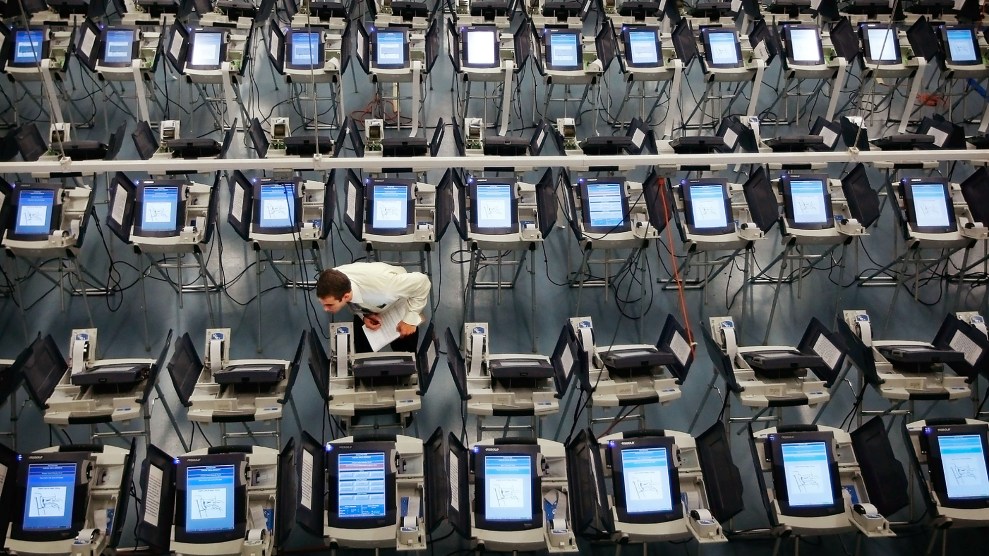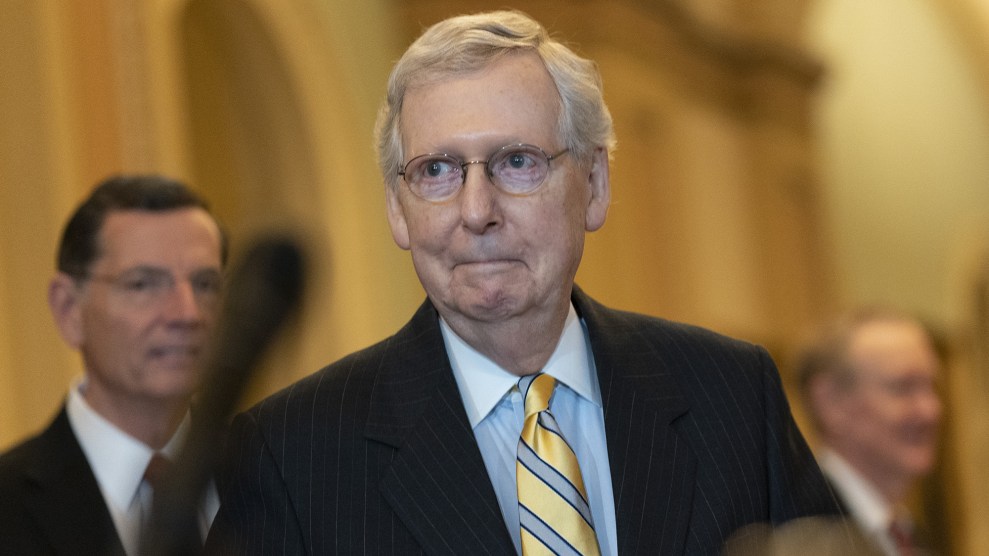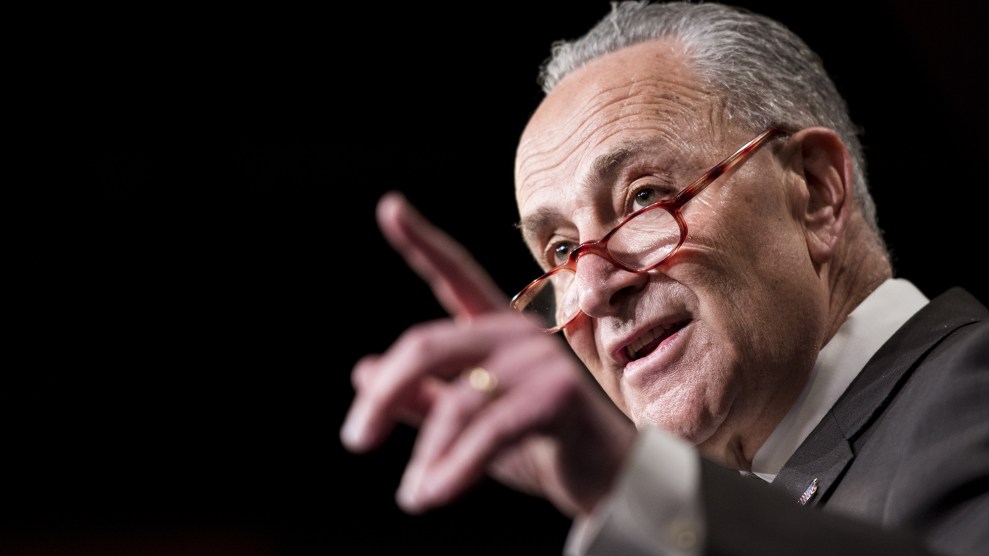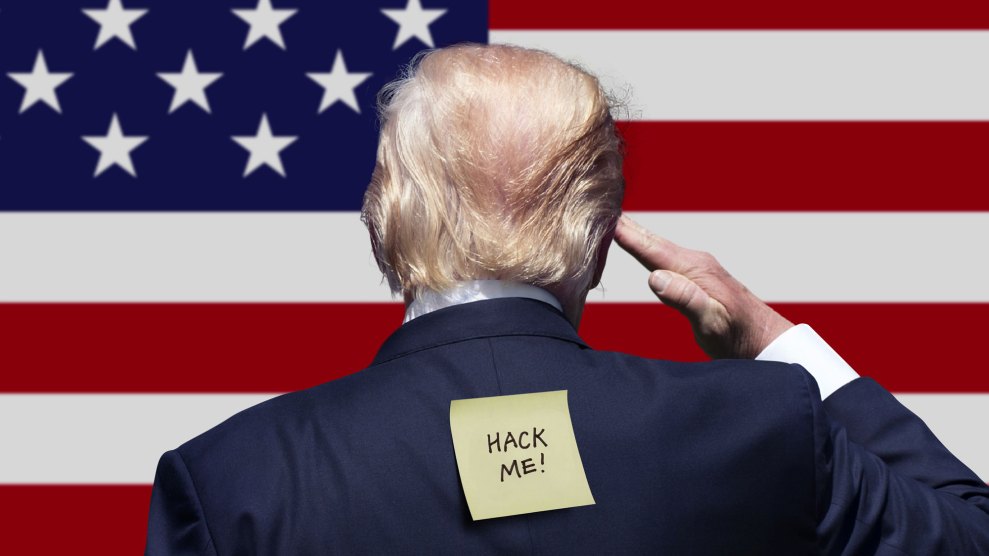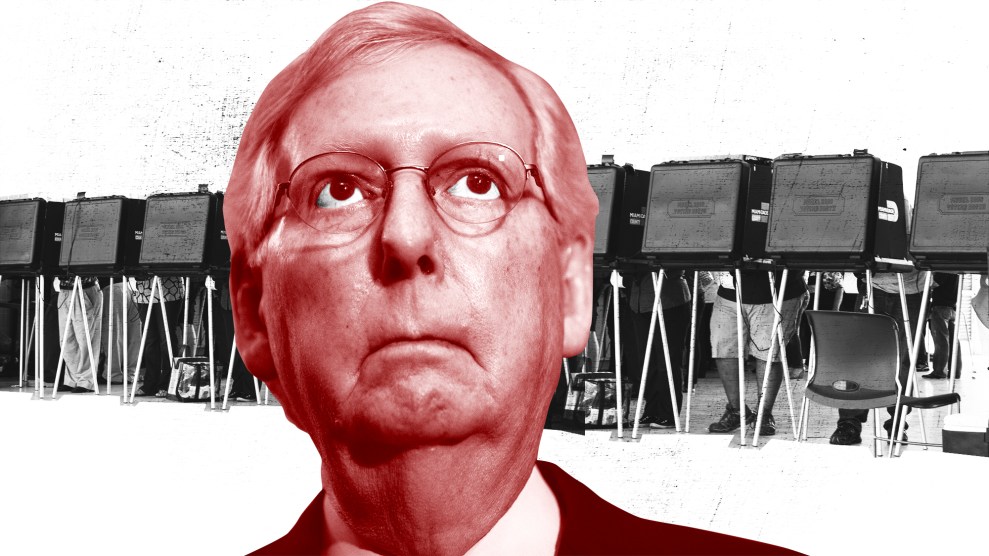
Mother Jones illustration; Stefani Reynolds/ZUMA, Michele Sandberg/Getty
Don Blevins, Jr., has a lot to think about. In his job as the clerk of Fayette County, home to Lexington, the University of Kentucky, and more than 240,000 registered voters, he’s in charge of making sure elections happen securely and accurately. “There’s a lot of hand wringing over the Russians, there’s hand wringing from the far right about illegal immigrants voting and all that,” but Blevins says he’s more worried “about Americans cheating than anybody.”
Blevins cites a range of possible disruptions—from bomb threats to jamming the internet connections used to verify voter registration—that could cause long lines or deflate public confidence in the accuracy of the tally. While Blevins, a Democratic elected official, insists Fayette, the state’s second-largest county, is well resourced and equipped to securely conduct balloting, he worries about less populated regions.
“The smaller counties are in dire straits, and Kentucky for a combination of reasons,” Blevins said. “They are chronically underfunded for just basic government services, much less elections related expenses.”
Meanwhile in Washington, DC, Mitch McConnell, a Kentucky senator for the last 34 years and, as senate majority leader, Congress’ most powerful Republican, has steadfastly refused to allow meaningful election security legislation to reach the Senate floor while stymieing most related funding, arguing new laws or mandates would be an overstep of federal power.
“Mitch’s inaction is directly harming his home state,” Blevins said. “There’s no question in my mind.”
In a country with more than 10,000 voting jurisdictions, the situation in Kentucky is in most ways like any other state, with some officials finding election security challenges easier to meet than others. In conversations with administrators responsible for balloting in half a dozen counties across the Bluegrass state—some large, some small—McConnell’s fights in DC can sometimes seem remote.
Larry Norden, director of the Brennan Center’s election reform program, says McConnell’s position is not only hurting his own state. “His role as to what’s happening in Kentucky is the same as his role in the other 49 states,” he says. “At the end of the day, around the country, election jurisdictions are underfunded, we don’t have national standards or a floor for election security for the most part. And he’s one of the main reasons we don’t.”
While some Kentucky officials say their counties have the equipment and funding they need to securely conduct balloting, others say counties can barely afford to meet other critical needs, let alone to upgrade and maintain election infrastructure. Ahead of this month’s knife edge-gubernatorial race, local officials faced a reduction in state voting funds. Money from Washington could make up some of the gap and help counties upgrade equipment.
Earlier this month, Republican Matt Bevin narrowly lost his reelection bid to Democratic Attorney General Andy Beshear in a contest where 29 of 120 Kentucky counties voted on machines with no voter-verifiable paper trail. Efforts to change this, kicked off by a February 2018 State Board of Elections mandate that all newly purchased machines produce such records, have been hampered by a lack of funds. That year, Democrats in Congress managed to secure a modest $380 million dollars to bolster state election security. In a plan submitted to the federal Election Assistance Commission, Kentucky said it would spend $4.6 million of its $5.7 million share over the next two years replacing and upgrading equipment in the non-paper counties. The plan noted that fully replacing Kentucky’s 13,000 non-paper trail voting machines would cost far more—$18 to $28 million.
In a letter sent September 10 to the legislature complaining about underfunding, State Board of Elections executive director Jared Dearing and his deputy warned that counties would get less state aid to carry out elections. They wrote that while a 1974 state law requires a reimbursement rate of $255 per precinct to help offset local costs, given funding shortfalls from the legislature the board had voted in August “under protest” to reimburse counties just $200 per precinct; his letter noted that if the 1974 rate had kept pace with inflation the amount would be more than $1,300 per precinct in 2019 dollars.
“Many counties are currently facing budgetary shortfalls that create uncertain and unstable funding for the county clerks and boards of elections,” the letter reads. “While at the same time election costs continue to grow. This included the need to replace outdated election equipment as well as secure against digital and cybersecurity threats that did not exist even a decade ago, much less in 1974.” When asked for comment about the state of election security and funding in Kentucky, the state board of elections provided Mother Jones a statement complaining of shortfalls in funding, including from Washington.
“The State Board of Elections has full confidence in our state and county officials,” the statement read. “However, moving forward, stable funding sources must be made available at the federal, state and local levels.”
McConnell has largely stood in the way of increased federal funding. In June, Congressional Democrats passed the Securing America’s Federal Elections Act, which would have allocated over $1 billion to states and mandated voting machines be manufactured in the United States, use voter-verified paper ballots, and not be connected to the internet.
In July, Kentucky’s Democratic Secretary of State Alison Lundergan Grimes wrote to McConnell and Sen. Rand Paul (R-Ky.) noting that their state was one of just three with elections scheduled for 2019, and urging the senators to support the SAFE Act. “Securing our election systems is a matter of national security,” Grimes wrote. “The Commonwealth and this nation need your leadership.”
A few weeks later McConnell wrote back, attacking the SAFE Act as a “partisan messaging bill” with no chance of passing the Senate or being signed by the president. McConnell said his opposition to the bill was rooted in a desire to defend Kentuckians “from Democrats’ insistence that piling up as much money and power as possible in Washington D.C. is the answer.” He closed his letter by raising an unfolding scandal surrounding Grimes’ alleged steering of a state election security contract to a firm run by campaign donors, writing that “it would be helpful to know that any future money would be put toward actually securing elections for the Commonwealth.”
McConnell has been forced to address his opposition to federal election security legislation several times. In June he told Fox News that such efforts were part of a House Democratic push for “full-bore socialism.” As long he was the majority leader, he pledged, “none of that stuff is going anywhere.” Alongside his stated view that states should keep control of elections, some have speculated that he’s avoided the issue for fear of upsetting President Trump, who links the topic to the Russia investigations that plagued his first two years in office. “[He] knows full well that blocking election security legislation makes it easier for Russia and other foreign powers to attack the next election,” Sen. Ron Wyden (D-Ore.) told Politico in early August at a cybersecurity event. “And my sense is this is a price Mitch McConnell and Donald Trump are willing to accept.”
Proponents of more federal involvement in election security frame it as commonsense national security issue, highlighting the mismatch of city and county officials squaring off against professional hackers on the front lines of geopolitics. As one local election official quoted in the Senate Intelligence Committee’s report on Russia’s 2016 interference put it, “if a nation-state is on the other side, it’s not a fair fight.”
In July, as the nickname “Moscow Mitch” spread on cable news and social media, and a Washington Post columnist described McConnell as a “Russian asset…blocking us from defending ourselves” from election attacks, McConnell took to the Senate floor to fight back.
As McConnell mounted a defense of his election security record, he argued he’d been a Russia hawk for “decades” and that the attacks amounted to “modern-day McCarthyism” and “unhinged smears” from left-wing media. “My opposition to nationalizing election authorities that properly belong with the states is not news to anybody who’s followed my career,” he insisted
“This cut him to the quick,” says Al Cross, a veteran Kentucky journalist who has covered McConnell’s career since its inception, trying to explain his forceful response. “He also realized that this just might be one of those political appellations that sticks, and it would be very bad for him.”
Sen. Chuck Schumer (D-NY), the senate minority leader, spoke immediately after McConnell. “The Republican majority has done nothing, absolutely nothing,” he said, adding that “an easy way for Leader McConnell to silence the critics who accuse him of blocking election security” would be to “stop blocking it.”
The floor debate came nearly two months after House Democrats had approved $600 million for state election security, requiring new voting machines have a paper trail, be manufactured in the US, and be air gapped to the internet. No sooner had it passed than House Republicans said it would go nowhere, echoing McConnell.
On September 19 McConnell announced on the Senate floor that he would instead support an additional $250 million in election security funding for states—less than half the amount already approved by the house.
Gabrielle Summe, Kenton County’s clerk and the president of the Kentucky County Clerks Association, says federal funding is vital. “Those dollars are seriously important,” she says. While her county, just across the Ohio River from Cincinnati, is the third largest in the state, which Summe says provides a healthy tax base allowing them to largely fund their own voting machine upgrades, unlike counties with shrinking populations and property values. “The vote down in Robertson County, which is the smallest county in Kentucky, is as equally important as the 130,000 potential votes here in Kenton,” Summe said.
Summe is in the process of purchasing new machines she hopes will be ready for the 2020 presidential primary and said she has well-trained staff and great relationships with both the county officials who approve her budget and the state board of elections. But other counties are in a “crisis situation,” Summe says, having neglected election administration in favor of other essential services. “Until something doesn’t work, they’re going to have to pick and choose what’s important.”
When asked about McConnell’s role in securing federal funding, Summe was diplomatic, saying only that decisions made in DC mean a great deal to officials in Kentucky tasked with running elections. While Summe is a Republican, the Washington partisan divide over election security that McConnell has done so much to exacerbate is generally reflected in his home state.
Republican Onzie Sizemore, the clerk of 10,000 person Leslie County in southeast Kentucky, admits that “a paper trail might would be better”—the county’s machines, only a few years old, don’t have one—but he says he trusts the equipment will deliver an accurate count. In terms of McConnell’s back-and-forth with Democrats in Washington over election security, he says he’llk defer to the senator’s approach.
“I have a lot of respect for Sen. McConnell and I would trust his judgement on that, to be quite honest,” he said. “I certainly know for sure he has a lot more information on that than I.”
Kayla Carnes, the deputy clerk in neighboring and majority-GOP Bell County, reported that funding is “not a problem for us,” and said she had no opinion on McConnell’s approach to election security. “Everything’s going fine.”
That’s far from what Jennifer Carter says is the situation in northeastern Kentucky’s Elliott County, where she serves as clerk, “Our county just takes in enough to stay afloat,” she says. In 2016, the county broke a 144-year streak of voting for Democratic presidential candidates, as the virtually all-white pool of 5,300 registered voters gave 70 percent of their ballots to Trump.
“For the last six or eight years, we have not taken in enough tax money to maintain anything…If they get four or five miles of blacktop for this entire county in one year, we’re flying. That’s how bad it is. So, yeah, election equipment or replacing machines? That’s on the back, back burner,” Carter, a Democrat, says.
She’s hopeful a new occupational tax will boost county spending, but even so Carter says “it would just not be possible for us to have the money to upgrade our voting machines. We’re one emergency away from disaster,” noting that the county hasn’t purchased new equipment in over 16 years.
The state did supply the county with new e-poll books to check voter registration on Election Day, “but it’s even hard for us to transition to that, because that requires training. For us to get all our people somewhere for training—it’s probably not going to happen.”
Aside from federal funding, Carter said the county could use more practical federal support. “The Homeland Security stuff that I have seen has basically been a tube that we were mailed with posters to put up,” she complained.
If McConnell dropped by the county to talk elections, “I would show him one of our old machines,” she said. “I’d say, ‘Hey, this is where we’re at, this is what we still have. If two machines break, we’d be doing paper ballots in a box.'”

